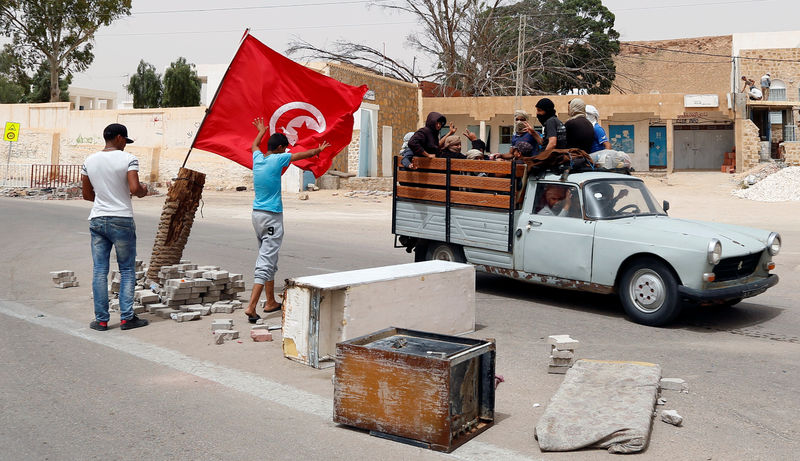By Zoubhir Souissi
KAMOUR, Tunisia (Reuters) - In Tatatouine province in Tunisia's southern Sahara, around 1,000 protesters living in a makeshift campsite are threatening to blockade roads used by foreign companies to access nearby gas and oilfields.
They want a larger slice of the gas proceeds to go towards the development of Tatatouine, an area of high poverty and unemployment. Flags and banners hanging in the desert heat ask "Where is our energy wealth?".
Their weeks-long protest has disrupted production as some companies close fields as a precaution. Last week, President Beji Caid Essebsi for the first time ordered the army to protect strategic phosphate mines and gasfields operated by companies including Italy's ENI (MI:ENI) and Austria's OMV.
Rights groups have warned that this could lead to violence in the south, an area of unrest where many people feel abandoned by the government. The army has not yet arrived at the camp but the flags promise 'no surrender'.
"We paid no attention to the president's speech. We will continue our peaceful protest for our rights, that is development, work and our share in energy riches," said Tarek Haddad, one of the protest leaders at the Kamour camp in Tatatouine.
"We are ready to talk, but we won't give up until our region gets solutions."
Six years after its revolution ended Zine El-Abidine Ben Ali's autocratic rule, Tunisia is once again faced with the reality of how far its uprising has fallen short for many in the marginalized southern regions where the revolt first started.
Praised by Western governments as a model for democratic transition, Tunisia has mostly failed to deliver the economic opportunities to match its political success, leaving many youth with little hope.
The protests are another challenge for Prime Minister Youssef Chahed whose government is struggling to enact sensitive subsidy and public spending reforms demanded by the IMF and other lenders to help stabilize economic growth.
Tunisia is a small oil and gas player compared with neighboring energy giants Libya and Algeria, OPEC members and major suppliers to European markets. But its economy is just recovering from 2015 Islamist militant attacks on tourists.
Protests targeting energy production are not new. British gas company Petrofac (LON:PFC) last year threatened to leave Tunisia and end its investment after protests over jobs disrupted gas production for nine months.
ENI says the protests have not affected its production. But OMV has removed 700 non-essential staff and contractors as a precaution. Perenco halted production at its Targa and Baguel fields, while protests closed Canada-based Serinus Energy's Chouech Essaida field.
The government says protests around phosphate mines, another key earner, caused losses of around $2 billion since 2011. But they ended after negotiations, allowing state production to rise the highest levels since 2010.
At Kamour, a brigade of National Guard troops keeps watch on the protests at the camp which is about 5 km from a gas pipeline. There was no sign of the army but an army spokesman said on Thursday the military were coordinating with the interior ministry to carry out the president's instructions.
"Cutting off routes and halting energy production is a crime," Energy Minister Hela Chikhrouhou said. "It will not be tolerated any more because it is destroying the economy."
INCREASING TENSIONS
Sending the army into a region that has faced unrest over jobs and lack of investment almost every year since the 2011 revolution, carries risk.
Even before then, Gafsa, the southwestern region at the heart of phosphate production, was seething with anti-government sentiment. In the town of Redeyaf a statue pays homage to a young man killed in 2008 rioting against Ben Ali's rule.
In many southern and central towns, agriculture is the main source of income. Near the Algerian and Libyan borders, fuel smuggling is also rife and opportunities scarce. Unemployment is around 15 percent nationwide, but almost double that in rural communities.
"I am an information technician graduate, but I've been unemployed for more than 5 years. It is not normal that we see nothing of the riches coming out of our region," said Nejib Daifallah, 30, one of the protesters in Tatatouine.
When Chahed visited Tatatouine last month to negotiate with protesters, he was greeted by crowds chanting "Get Out". They refused offers of infrastructure development and around 900 jobs including some in oil, environment or part of the government's "Dignity" program with the private sector.
Instead, they demanded at least 1,500 positions with oil companies and nearly $50 million in local investment.
Essebsi's decision to send in the army has had mixed reactions.
"This is not a foreign army that will be protecting our natural resources, it's the national army protecting our revolution," said Rached Ghannouchi , leader of the Islamist Ennahda party which is in a coalition with the ruling secular Nidaa Tounes party founded by Essebsi.
But opposition parties said it was a provocative step that would increase social tensions with young men simply seeking a better life. Rights groups said there was a risk of violence.

"Instead of calming the situation and looking for solutions for the social issues and unemployment, this will just increase tensions," opposition leader Adnen Monsar said. "You are sending in the army against peaceful protesters."